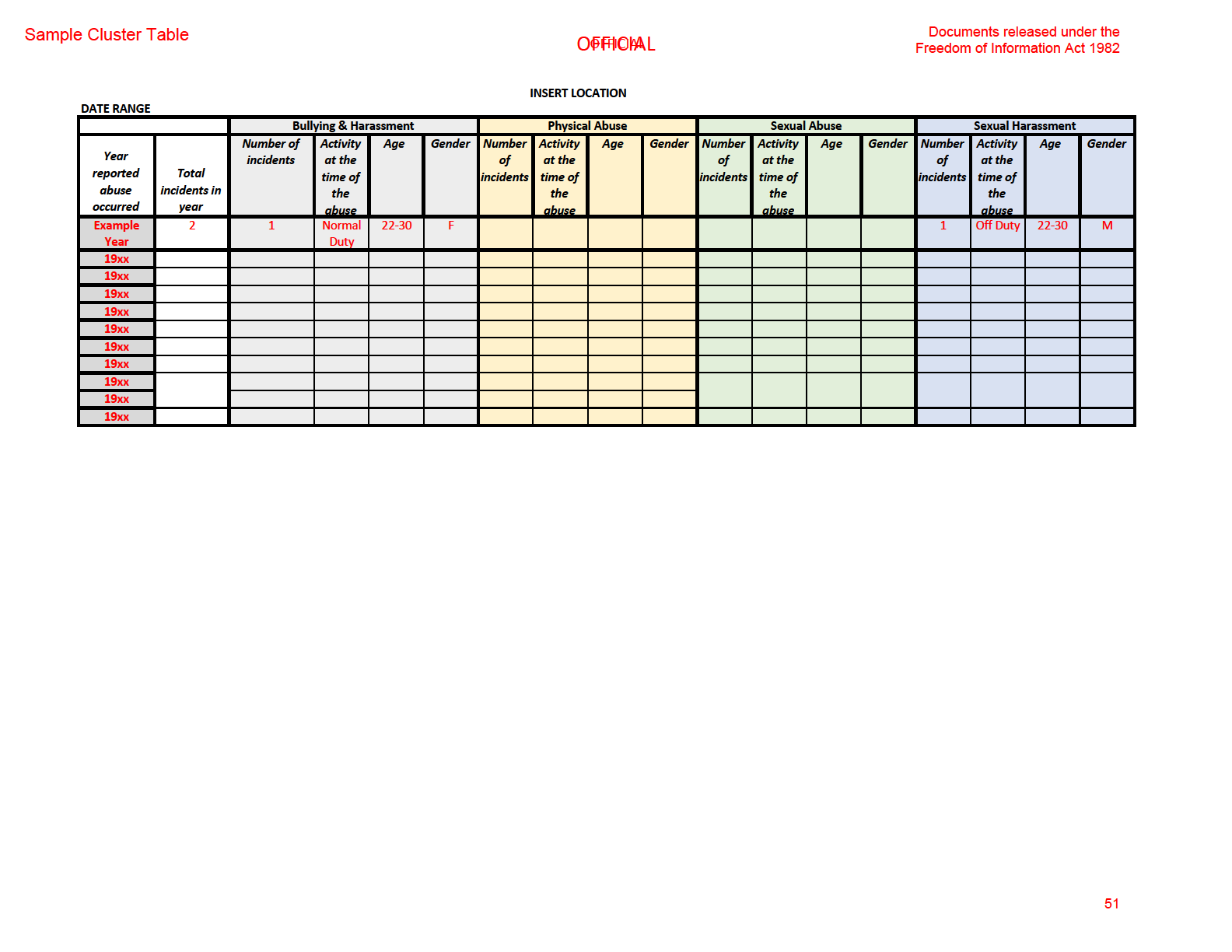Documents released under the
Document 1
OFFICIAL
Freedom of Information Act 1982
About this policy
This is a policy about the handling of personal Information by the Ombudsman. It applies to
both the Commonwealth and ACT Ombudsman. Its purpose is to give you a better
understanding of our personal information handling practices and to enhance the
transparency of Ombudsman operations. It gives effect to the Australian Privacy Principles
contained in the Privacy Act 1988.
Outline of this policy
‘Part A – Personal Information Management’ provides background on the functions and
activities of the Ombudsman and explains in general terms the kinds of personal information
collected by us, and how this is collected and held. It also explains how you can ask to see
your personal information that we hold and how you can ask to have details of your personal
information corrected. This part also explains how you can complain if you believe that your
personal information has been mishandled, or there has been a breach of your privacy by
us.
‘Part B – Records’ lists specific kinds of Ombudsman records on which personal information
is held. It explains in further detail the management of personal information by reference to
specific Ombudsman functions and activities, such as complaint handling and investigations.
You can find out here what sorts of records we keep, what kinds of personal information are
typically col ected on these records, and the purpose for which this information is collected,
held, used and disclosed.
‘Part C – Online’ explains the Ombudsman’s personal information handling practices when a
person visits the Ombudsman website.
Quick links
Part A – Personal Information Management
Background: functions and activities of the Ombudsman
How does the Ombudsman collect personal information
How does the Ombudsman hold personal information
What kinds of personal information does the Ombudsman collect and hold
For what purposes does the Ombudsman collect, hold, use and disclose personal
information
How can I access or correct my personal information held by the Ombudsman?
How do I complain about the handling of my personal information by the
Ombudsman?
25
OFFICIAL
Documents released under the
Freedom of Information Act 1982
Part B – Records: specific kinds of Ombudsman records that hold
Personal Information
Complaint handling and investigation records
Public interest disclosure records - agencies’ reporting requirements
Own motion investigation records
Inspection and law enforcement records
Immigration detention statutory reporting records
Miscellaneous contact records
FOI records
Voicemail records
International program records
Personnel records
Corporate and Administrative records including policy records
Strategic/agency liaison records
Part C - Online
26
OFFICIAL
Documents released under the
Freedom of Information Act 1982
Part A – Personal Information Management
Our obligations under the Privacy Act
The Commonwealth Ombudsman must comply with the Australian Privacy Principles
contained in the Privacy Act 1988 which regulate how agencies may collect, hold, use or
disclose personal information, and how individuals may access and correct personal
information held about them. In this privacy policy
personal information has the same
meaning as defined by section 6 of the
Privacy Act1988:
‘
information or an opinion about an identified individual, or an individual who is
reasonably identifiable:
(a)
whether the information or opinion is true or not; and
(b)
whether the information or opinion is recorded in a material form or not.’
In this privacy policy
sensitive information has the same meaning as defined by section 6 of
the
Privacy Act 1988:
‘(a)
information or an opinion about an individual’s:
(i) racial or ethnic origin; or
(ii) political opinions; or
(i i) membership of a political association; or
(iv) religious beliefs or affiliations; or
(v) philosophical beliefs; or
(vi) membership of a professional or trade association; or
(vi ) membership of a trade union; or
(vi i) sexual preferences or practices; or
(ix) criminal record;
that is also personal information; or
(b)
health information about an individual; or
(c)
genetic information about an individual that is not otherwise health
information; or
(d)
biometric information that is to be used for the purpose of automated
biometric verification or biometric identification; or
(e)
biometric templates.’
Background: functions and activities of the Ombudsman
Our strategic vision is for administrative action by Australian and ACT Government agencies
and related service providers to be fair and accountable. Through investigation of their
administration we influence agencies to treat people fairly. This includes encouraging
agencies to have their own accessible, effective and targeted complaint handling services,
and oversighting agency compliance in the use of selected intrusive and coercive powers.
The
Commonwealth Ombudsman is a statutory office holder with a number of functions,
including:
Investigation under the Ombudsman Act 1976, of administrative actions of Australian
Government departments and administrative agencies, either on receipt of a complaint or on
the Ombudsman’s own motion,
27
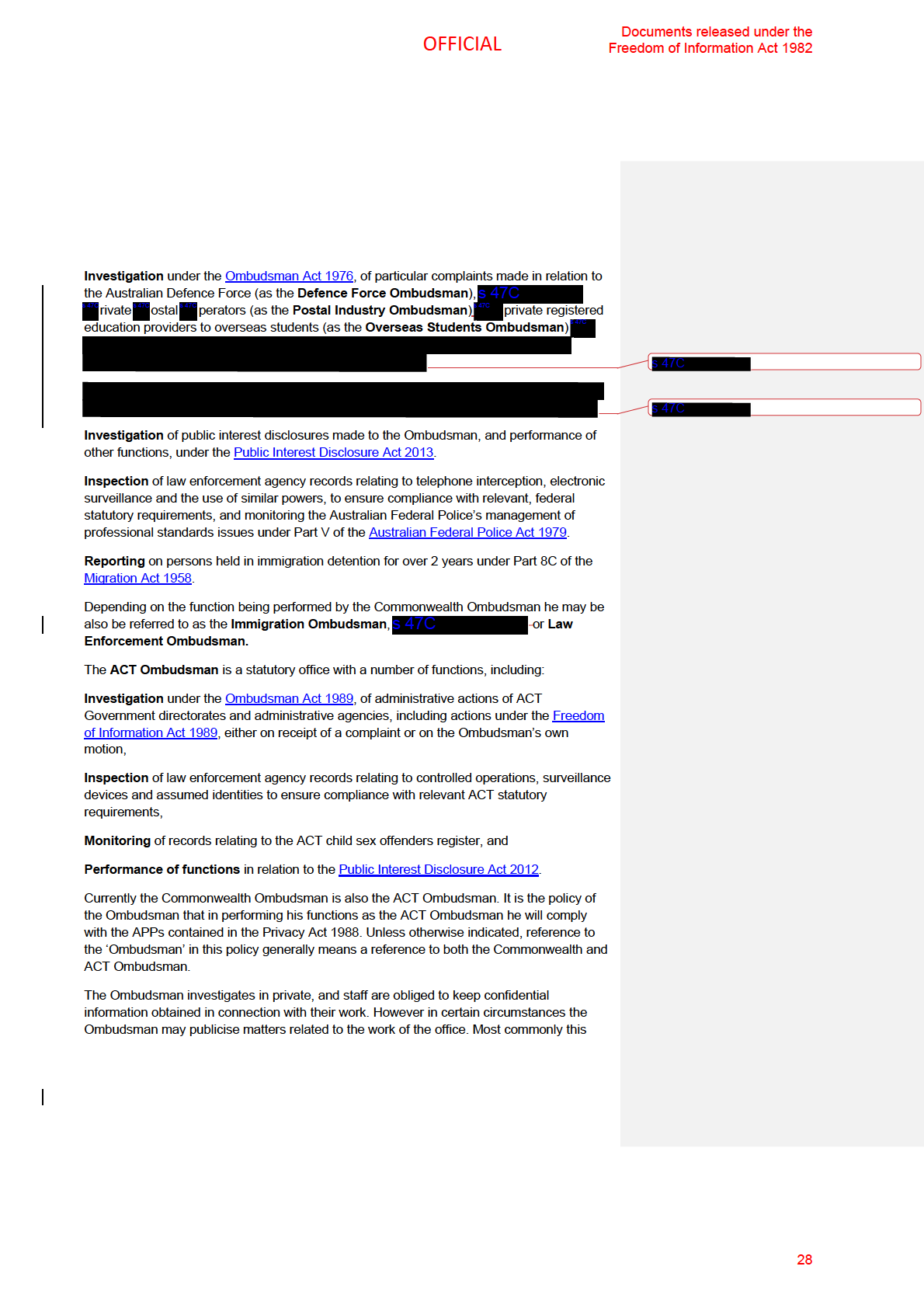
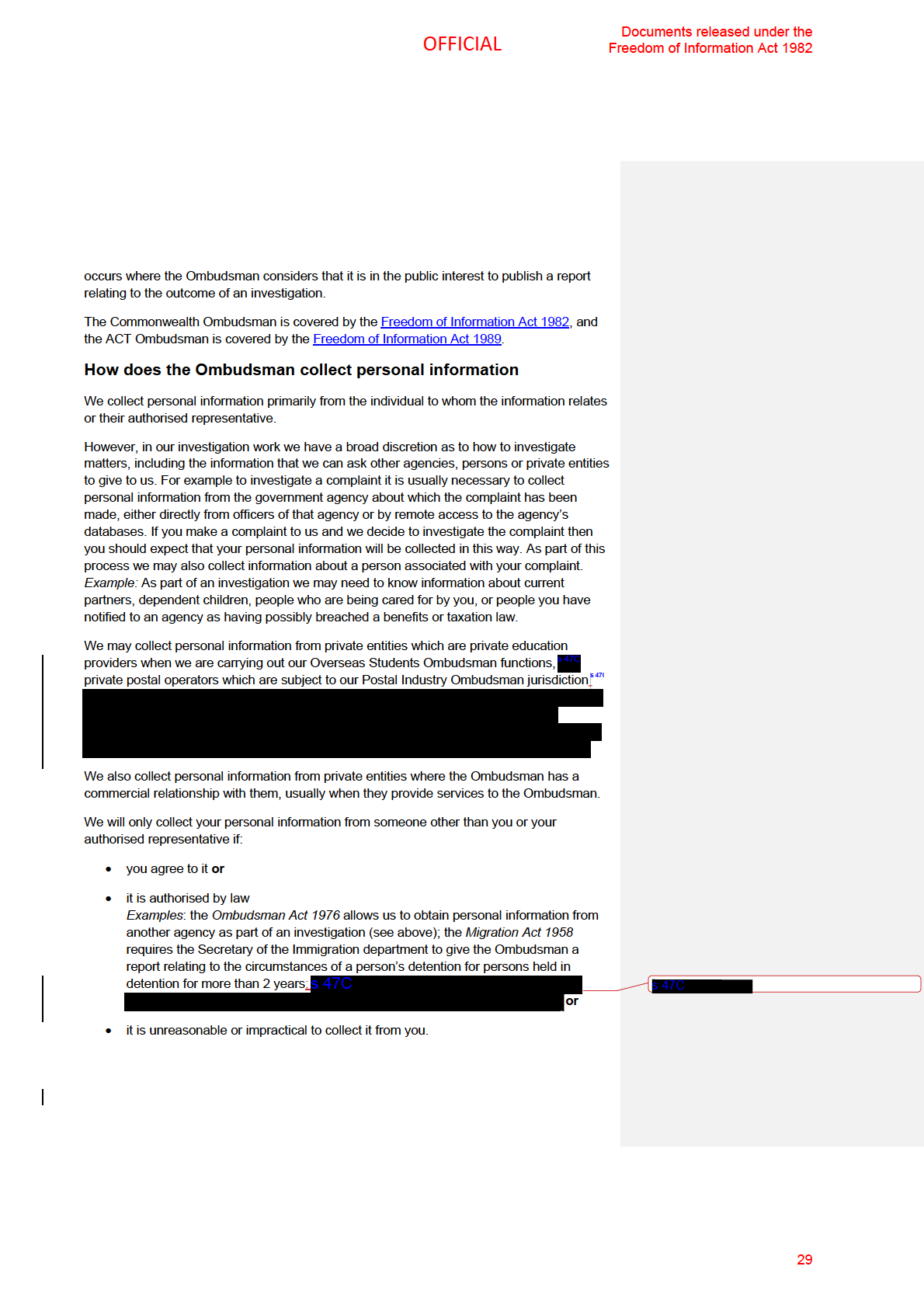
OFFICIAL
Documents released under the
Freedom of Information Act 1982
Sometimes in the course of an investigation, or in other circumstances, we are given
personal information about a person (which may be about someone other than the person
who made the complaint), and we have not asked for this information. This is called
‘unsolicited personal information’ see Privacy Act 1988, and it can be provided by the
complainant, an agency or another person. In these circumstances we wil assess whether
we would be permitted under the APPs to collect this same information from the person
whose personal information it is. If we could have collected it from that person because of
our functions and activities, then we wil retain it, otherwise we wil destroy it. We wil not use
or disclose unsolicited personal information unless this is permitted by the APPs.
We wil endeavour to tell you if we collect solicited or unsolicited personal information about
you from someone else, however in some circumstances this wil be not be reasonable
Example: Because of the confidential nature of Ombudsman investigations we cannot
disclose that a person has made a complaint to the Ombudsman. Therefore it would be
unreasonable to tell a payer in a child support matter that we had collected their personal
information if this would disclose that the payee had made a complaint to the Ombudsman.
We collect personal information as a result of face to face meetings, telephone
conversations, in writing by mail, fax or electronic communication, and through submissions
of complaint forms through our website - see visiting our website
Part C
We also collect personal information in records made during inspections and reviews, and in
documents provided by agencies for the purposes of our inspections and reviews when
carrying out our Inspection functions described under
Background.
The Ombudsman conducts a number of activities and that are incidental to, and necessary
for carrying out his/her statutory functions described under
Background above. These are
best described as ‘corporate’ functions and include finance, accounting, procurement,
reporting, employment and human resources activities. Therefore in connection with our
corporate activities we collect personal information from a wide range of sources including
from job applications of prospective staff, directly from staff, other government agencies and
private entities.
From time to time the Ombudsman conducts surveys of people who have contacted the
office. Your personal information wil not be collected for this purpose unless you agree to it
prior to your participation in any survey.
How does the Ombudsman hold personal information
We hold personal information that we collect in both electronic and paper records. Apart
from our databases used to manage human resources, payrol and banking information we
maintain two operational databases. One is specifically designed to manage cases, ‘the
case management system’, and the other to manage administrative documents. Both
databases are controlled locally and securely. We take steps to ensure that personal
information we hold is protected against unauthorised access, use, modification or
disclosure, or other interferences. These steps include password protection for accessing
our electronic system, securing paper files in locked cabinets, safes and secure areas, and
physical access restrictions.
30
OFFICIAL
Documents released under the
Freedom of Information Act 1982
The case management system stores information in an interconnected fashion. This means
that we can access personal information directly by searching for a person’s name, or
indirectly, by searching with reference to a specific case number or another search
parameter. Many of these search parameters are set up to enable the Ombudsman to
access material and statistics to comply with his reporting obligations.
Access to records containing personal information is permitted on a ‘need-to-know’, work-
related basis, and subject to restrictions based on security clearance levels. In some cases
access wil be more tightly restricted.
Examples: personnel records are restricted to staff in the relevant area; access to
confidential legal advice records is restricted to members of the legal team.
Where appropriate, senior management may authorise the creation of virtual barriers that
prevent staff from physically accessing information contained in electronic records.
When no longer required, personal information is destroyed in a secure manner, or deleted,
in accordance with the Archives Act 1983
and the Ombudsman’s Records Authority, (for
Commonwealth Ombudsman records); or the Territory Records Act 2002
(ACT) and
Territory Records (Records Disposal Schedule—Ombudsman Complaint Management
Records) Approval 2011, (for ACT Ombudsman records).
What kinds of personal information does the Ombudsman col ect
and hold
In accordance with the Australian Privacy Principles we collect personal information to
enable us to carry out the Ombudsman’s functions and activities see
Background. We
collect and hold personal information relating to a wide range of people. These include
complainants, persons held in immigration detention, prisoners held in the ACT,
Ombudsman staff, Australian Government agency staff, ACT Government agency staff, staff
of State or international ombudsmen offices and foreign government organisations, staff of
private registered providers of education to overseas students, private postal operators s 47C
individuals who provide services to the Ombudsman as individuals or via organisations, and
other people who contact or approach the Ombudsman.
In general the kind of personal information we collect about you may include your name,
dates of birth, electronic (email), postal, street addresses, telephone number, occupation,
and details of your complaint. s 47C
You may complain to us anonymously or by adopting a pseudonym. However, if you do so it
may be difficult or impossible for us to investigate your complaint.
Example: if your complaint relates to an agency’s actions in handling a claim you have made
for a benefit, then we would not be able to investigate those particular actions without you
giving us your name and any relevant reference number.
We wil tell you if we cannot investigate your complaint because you have not supplied
sufficient identifying information.
31
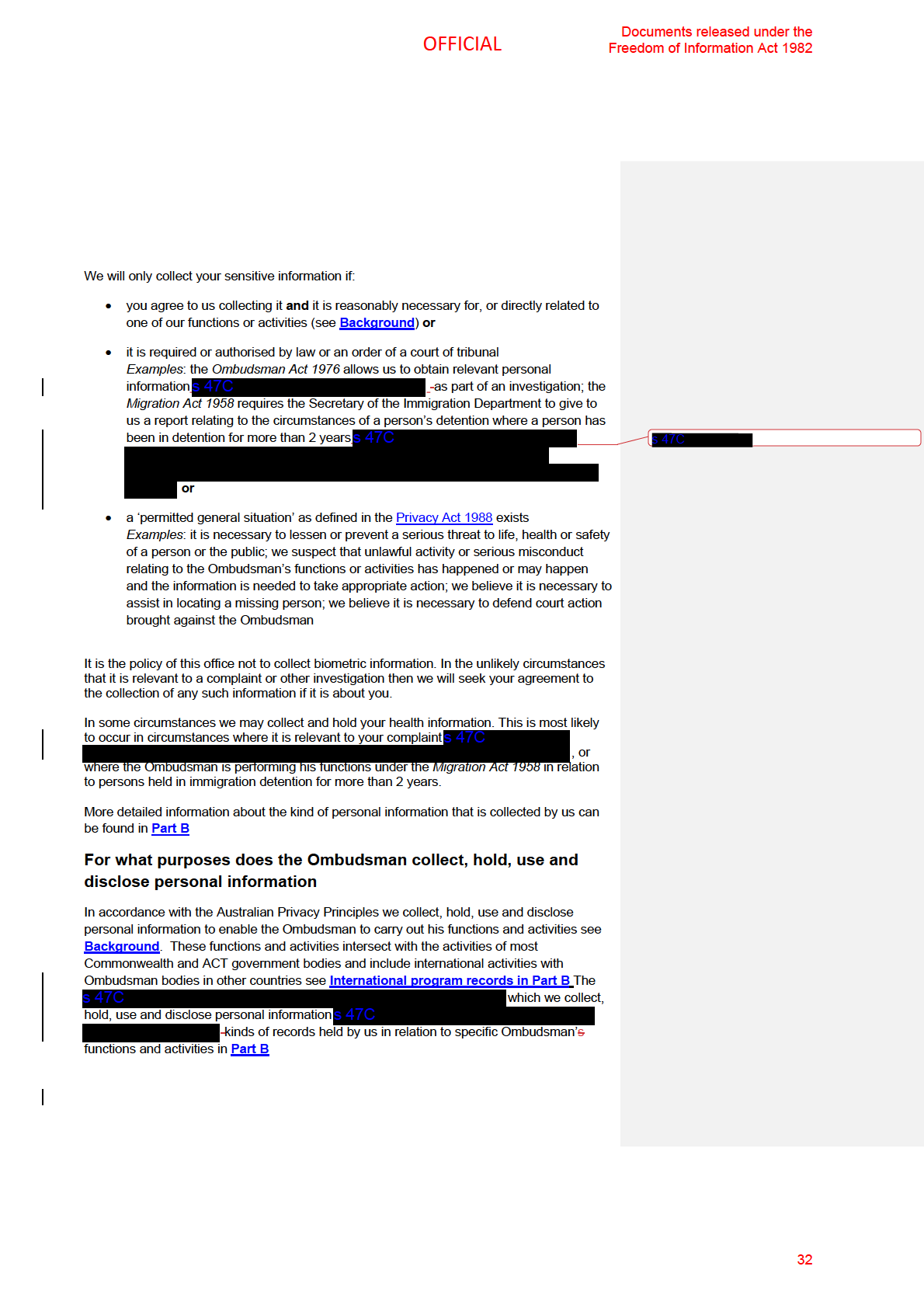
OFFICIAL
Documents released under the
Freedom of Information Act 1982
In addition, in order to maintain the integrity of, and administer and develop, internal
information technology systems, we use records contained in our databases which may
contain personal information for systems development and testing.
How can I access or correct my personal information held by the
Ombudsman?
You can ask to see your personal information held by us, and you can ask that it be
corrected if you think that it is wrong or not up to date. If you are speaking to an investigation
officer or a member of the public contact team you can ask them about this and they wil be
able to immediately update information such as your address or contact details if these have
changed. More formal or extensive requests should be addressed to the ‘Privacy Contact
Officer’ and sent by
•
over land mail to GPO Box 442, Canberra ACT 2601, or
•
email to xxxxxxx@xxxxxxxxx.xxx.xx.
You can also call 1300 363 072 and ask to speak with a Privacy Contact Officer.
Generally your request wil be considered by us with reference to the framework of the
Freedom of Information Act 1982 (for Commonwealth Ombudsman matters), and the
Freedom of Information Act 1989 (for ACT Ombudsman matters).
If, in considering your request, we believe that a document containing your personal
information should be withheld from you because an exemption under the FOI Act would
apply then we may withhold that document (or parts of it), and wil explain the reason to you
in writing. Requests for access wil answered within 30 days of the date on which the request
is made.
Ombudsman staff should refer to internal Ombudsman policies and guidelines in relation to
access to their personal information.
You may also seek access to, or request amendment or annotation of, your personal
information by submitting a request under relevant Commonwealth or ACT Freedom of
Information Acts. Information on how to make a request under the FOI Act may be found at
www.ombudsman.gov.au/pages/contact-us/seeking-information/. More general information
on FOI and Privacy may be found on the Australian Information Commissioner’s website
http://www.oaic.gov.au/freedom-of-information/freedom-of-information
How do I complain about the handling of my personal information
by the Ombudsman?
Complaints about privacy breaches by the Ombudsman must be made in writing. You can
address a complaint to the ‘Privacy Contact Officer’ and send by
•
over land mail to GPO Box 442, Canberra ACT 2601, or
33
OFFICIAL
Documents released under the
Freedom of Information Act 1982
•
email to xxxxxxx@xxxxxxxxx.xxx.xx.
You can also call 1300 363 072 and ask to speak with a Privacy Contact Officer.
You should set out how you say we have not handled your personal information in
accordance with the Australian Privacy Principles.
We wil acknowledge your complaint within 7 days and investigate and resolve all complaints
as soon as possible. Your complaint wil be referred to a Privacy Contact Officer, usually a
member of the Ombudsman legal team. Your complaint wil be investigated and you wil be
advised of the outcome of the investigation. Our decision wil be explained with reference to
the relevant APPs. The time this will take wil depend on the nature of your complaint and
how complicated it is.
If you are unhappy with our response or the way we have handled your complaint, you may
complain to the Australian Information Commissioner. Details on how to make a complaint to
the Information Commissioner can be found at www.oaic.gov.au/privacy/privacy-complaints.
Ombudsman staff should refer to internal Ombudsman policies and guidelines in relation to
complaints about interference with their privacy.
34
OFFICIAL
Documents released under the
Freedom of Information Act 1982
Part B – Records: specific kinds of Ombudsman records that hold
Personal Information
Complaint handling and investigation records
These records contain details of complaints made to us in relation to the Ombudsman’s
functions under the Ombudsman Act 1976, the Public Interest Disclosure Act 2013, the
Ombudsman Act 1989 (ACT) and the Public Interest Disclosure Act 2012 (ACT) see
Part A
Background. These include complaints made to the Commonwealth Ombudsman in his
capacity as the Immigration Ombudsman, s 47C
, Law Enforcement
Ombudsman, Defence Force Ombudsman, Postal Industry Ombudsman s 47C Overseas
Students Ombudsmans 47C
.
These files also record the actions taken by us in relation to those complaints, including
investigation and internal reviews of decisions made about those complaints. Because the
Ombudsman can investigate complaints about most Commonwealth and ACT government
agencies, as well as some private contractors to the Commonwealth, the kind of personal
information that is col ected and held on these files can vary greatly and wil depend on the
nature of the complaint.
Example: if you complain about an agency’s decision about government benefits the
personal information might include your pension status, use of appeal or review
mechanisms, complaint and/or customer reference numbers with the other agency, how the
action complained about has affected you, and any outcome you would like to obtain.
These files may also contain sensitive information.
Examples: A complaint about how you have been treated while held in immigration
detention, or a decision about a visa application, might include
details of your physical or
mental health, disabilities, sexual orientation, racial or ethnic origin, criminal convictions,
religious beliefs, community and/or political affiliations, financial circumstances, or personal
relationships; an overseas student complaint or external appeal about a private registered
education provider, might include details of your visa status, your country of citizenship, your
enrolment details, your academic results, medical certificates or other health records
provided in relation to your attendance, or other personal details about compassionate and
compelling circumstances that may have affected your studies in Australia; a complaint from
a prisoner held in the ACT may include medical information, details of legal representatives,
social workers, other prisoners and associates, and video footage of prison incidents.
Personal information of the kinds described above may also be held in relation to someone
other than the person who has made the complaint. Other people whose personal
information may be held on these files include relatives or friends of the complainant, staff of
other government agencies or s 47C government service providers s 47C
Personal information described above is col ected to enable us to decide whether your
complaint is within the Ombudsman’s jurisdiction, whether there is a reason not to
investigate the complaint, the agency s 47C
about which the complaint is made,
35
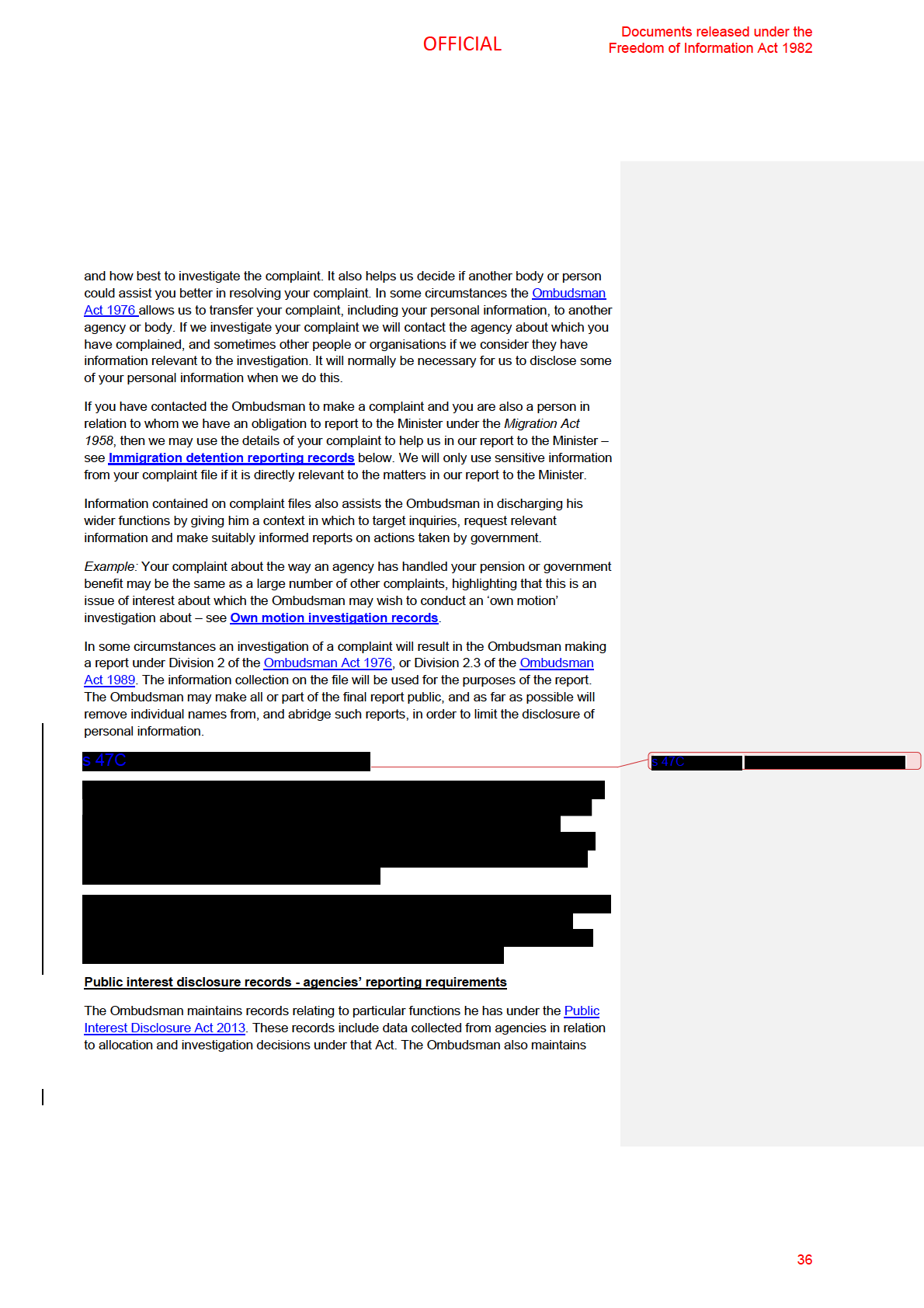
OFFICIAL
Documents released under the
Freedom of Information Act 1982
records of requests made by agencies seeking an extension of time in relation to the
handling of a disclosure. The data collected for these purposes may contain personal
information including the name and contact details of the discloser and the nature of the
disclosure s 47C
In addition agencies are
required to provide further information to the Ombudsman for Annual Reporting purposes,
such information would be de-identified and unlikely to contain personal information.
Own motion investigation records
The Ombudsman may commence an investigation on his or her own motion. This means
that the Ombudsman may investigate an issue of interest that relates to public
administration s 47C
without a specific complaint, or in relation to a group of
similar complaints. We maintain separate files in relation to these investigations, managed
both electronically and in paper formats.
The kinds of personal information contained on these files may include that described under
Complaint handling and investigation records. The Ombudsman has broad powers to
conduct own motion investigations in a manner he/she determines to be most appropriate,
and by obtaining information from a wide range of sources, including individual complaint
and investigation records.
As with complaint files, information contained on own motion investigation files may be
disclosed to the s 47C
agencies s 47C
in relation to which the investigation is
being conducted.
An own motion investigation wil usually result in the Ombudsman making a report under
Division 2 of the Ombudsman Act 1976, s 47C
or Division 2.3 of the Ombudsman Act 1989. The
information collection on the file wil be used for the purposes of the report. The Ombudsman
may make all or part of the final report public, and as far as possible wil remove individual
names from, and abridge such reports in order to limit the disclosure of personal information.
Inspection and law enforcement records
The Ombudsman keeps records relating to the performance of statutory inspections and
review roles. These roles involve assessing the compliance of certain federal, state and
territory law enforcement agencies with legislation that deals with, amongst other things,
telecommunications interception and access to stored communications, surveil ance device
use and the conduct of controlled operations. As the ACT Ombudsman the Ombudsman
also has an inspection role in relation to the use of assumed identities, and has a particular
role to play in monitoring records relating to the ACT child sex offenders register. The
Commonwealth Ombudsman also undertakes inspections under the Australian Federal
Police Act 1979 and review activities under the Fair Work (Building Industry) Act 2012.
Records of the Ombudsman’s inspection and review activities may include personal
information of the following kinds:
37
OFFICIAL
Documents released under the
Freedom of Information Act 1982
•
the names of judicial and agency officers who issued, or are authorised to issue
warrants, notices and authorisations;
•
the names of Ombudsman staff and staff of other agencies; and
•
the names and contact details of people who have made, or are the subject of,
complaints to the AFP;
•
criminal histories, records of police interviews, CCTV footage and police incident
reports;
•
the names, addresses, employment details, video footage, and transcripts of
examinations kept as part of the Ombudsman’s functions under the Fair Work
(Building Industry) Act 2012.
We maintain separate files in relation to inspections activities, which are managed in paper
and electronic formats, with access restricted to the Ombudsman’s inspections and law
enforcement team.
Immigration detention statutory reporting records
The Ombudsman keeps records relating to the performance of his immigration detention
reporting function under Part 8 of the Migration Act 1958. This requires the Ombudsman to
report to the Minister for Immigration on persons held in immigration detention for more than
two years, and every six months thereafter while the person remains in immigration
detention. We maintain separate files in relation to this role, managed both electronically and
in paper formats.
These records contain personal information relating to immigration detainees and may also
contain personal information about employees of the Department of Immigration and Border
Protection or service providers contracted to that department. These records could include
personal information about immigration status, criminal charges and convictions, tribunal
decision records, court records, detention incidents, health and welfare summary reports, full
mental and physical health records, details of prescribed medication, racial or ethnic origins,
political affiliations, details about refugee claims, personal relationships and the financial
status of persons held in detention. Records may also include information provided by other
agencies (such as the Australian Federal Police and other government agencies), with their
permission, or obtained using the Ombudsman’s formal powers.
Personal information (including sensitive personal information) is obtained from the
Secretary of the Department of Immigration and Border Protection as part of his/her
obligation under section 480N of the Migration Act 1958, and from individual complaint
records. In addition we may obtain personal information from legal representatives and
advocates for detainees, and from detainees directly, through interview and/or documents..
Sensitive personal information is only used if directly relevant to the Ombudsman’s reporting
functions.
In accordance with Part 8 of the Migration Act 1958 when the Ombudsman makes a report
to the Minister it wil contain personal information about the person held in detention
including the name of that person. The version of the report that is provided for tabling in
Parliament wil not, as far as possible, contain personal information that can identify the
person held in detention and does not include the person’s name. Other de-identified
information includes date of birth, place of birth, nationality, citizenship, ethnicity, other
38
OFFICIAL
Documents released under the
Freedom of Information Act 1982
people’s names (including medical professionals, advocates, lawyers and migration agents),
hospitals, and the Department of Immigration and Border Protection’s unique person
identifier. In some cases, information about a person’s current detention placement may be
de-identified. In other cases, information is not only de-identified but redacted, for example,
where the report includes personal medical detail or sensitive information about minors.
Procedures relating to handling these files are regularly reviewed and access to these
records is only permitted to members of the relevant team responsible for this function.
Miscellaneous contact records
The purpose of these records is to record details of approaches made to the Ombudsman
that do not constitute complaints for the purposes of either the Commonwealth or ACT
Ombudsman Act. Such approaches may be from members of the public, officers of other
agencies, the media and researchers. The records may also contain complaints about us
and how we may have handled your complaint or relate to alleged breaches of the
Ombudsman’s service charter or other matters. The kinds of personal information stored on
these records may reflect any of the kinds described above.
Freedom of Information (FOI) records
The purpose of these records is to record all requests for information made to the
Commonwealth Ombudsman under the Freedom of Information Act 1982 and, to the ACT
Ombudsman, under the Freedom of Information Act 1989. These files also record requests
for internal review of Ombudsman FOI decisions, as well as requests for annotation and/or
amendment of records. We also record our interactions with the Office of the Australian
Information Commissioner in respect of FOI complaints and Information Commissioner
reviews.
Personal information on these records may relate to the person who has made the FOI
request, complainants to the Ombudsman (whether or not they are also the FOI applicant),
Ombudsman staff, staff of other agencies, and any other person whose personal information
is contained in the record to which FOI access has been sought.
Most requests that we receive under Freedom of Information law relate to complaint
investigation files, therefore usually the personal information wil consist largely of the kinds
mentioned above under ‘Complaint handling and investigation’.
Voicemail records
Telephone calls to our 1300 362 072 number may be recorded. You wil be advised if your
call wil be recorded. These records registered on our phone system may relate to a range of
matters, including complaints, general enquiries, media enquiries, and contact by other
agencies. The personal information contained in them may include a cal er’s name, address
and telephone number. Depending on the subject matter of a recording the information
contained in it wil be placed onto other records either as an audio record or reduced to a
39
OFFICIAL
Documents released under the
Freedom of Information Act 1982
written form (not necessarily an exact transcription), and be handled accordingly. Once
placed with the relevant record the recording is destroyed.
These records may also be used for training and quality assurance purposes.
International program records
The purpose of these records is to capture our work in improving the quality and
performance of ombudsman offices in countries within the Asia-Pacific region. Files typically
contain details about the development and delivery of relevant programs and projects,
including details of overseas visits and liaison activities with other ombudsmen.
Personal information contained on these files is generally limited to that of Ombudsman
staff, staff of other State or international ombudsmen offices, and staff of other Australian or
international government organisations. It may include names, business and personal
address details, CVs and information relating to expressions of interest for employment,
information about next of kin and emergency contacts, birth and gender details, medical
information and passport details.
Passport pages and the personal information contained in them are used for arranging travel
and accommodation as well as enabling our counterpart organisations to send accurate
letters of invitation for the purposes of arranging visas. Consequently this information may be
sent to diplomatic missions of countries in the Asia pacific region.
Next of kin and medical information may be revealed to overseas countries in the case of an
emergency. We also hold such information in relation to staff of overseas counterpart
organisations who visit our office.
CVs and expression of interest documents containing personal information of Ombudsman
staff are sent to our counterpart organisations overseas as a way of introducing placement
officers. Likewise we receive and hold this information in respect of staff of our overseas
counterpart organisations which visit or work in our office.
The countries to which we send (usually through their diplomatic missions within Australia),
personal information described above include the Republic of Indonesia, Solomon Islands,
Samoa, the Independent State of Papua New Guinea, Republic of Kiribati, the Republic of
the Marshall Islands, New Zealand, Republic of Peru, Cook Islands, Niue, the Kingdom of
Tonga, the Republic of Nauru, and the Republic of Vanuatu.
Personnel records
The Ombudsman has duties and powers as an agency head under the
Public Service Act
1999 and has other associated obligations including those arising under the
Disability
Discrimination Act 1992, the
Sex Discrimination Act 1984,
the
Fair Work Act 2009, the
Safety Rehabilitation and Compensation Act 1988, the
Superannuation Act 2005, the
Long
Service Leave (Commonwealth Employees) Act 1976, the
Maternity Leave (Commonwealth
Employees) Act 1976 and the
Work Health and Safety Act 2011. Records are kept by us to
enable the Ombudsman to discharge his functions in relation to these obligations and related
responsibilities in respect of staff, employees and contractors.
40
OFFICIAL
Documents released under the
Freedom of Information Act 1982
Personnel files are kept to maintain records about all aspects of employment including
recruitment, employment history, payroll, leave, equal employment opportunity data,
workplace relations, security clearances, performance, workplace health and safety,
rehabilitation and compensation. These records are kept in relation to all permanent,
contracted and temporary staff members/employees of the Ombudsman.
Access to personnel files is controlled on a ‘need to know’ basis. Not all members of the
Human Resources team have access to all personnel files. Spreadsheets used to capture
personal information are password protected.
Personal information is disclosed on a ‘need to know’ basis to the Department of Prime
Minister and Cabinet for the purposes of administering our payroll, and to travel providers
under the ‘whole of government’ travel arrangements. In addition we are required to give
personal information to various bodies including the Australian Public Service Employment
Database, the Australian Government Security Vetting Agency, the Australian Taxation
Office and Comcare
Staff should refer to internal guidelines for more detail in relation to these records.
Corporate administrative records including policy records
The purpose of administrative records is to hold information relating to corporate functions,
including office governance, financial management, procurement, legal services, privacy,
information, communications and technology, public affairs and both physical and
information security.
Such files may contain a range of personal information relating to complainants, contracted
service providers, Ombudsman staff (and staff of other agencies) as well as members of the
wider community. Such information is likely to mirror the kinds described above in relation to
complaint investigations.
Strategic/agency liaison records
The purpose of these files is to record information and activities relating to policy aspects of
the Ombudsman’s work, for example the development of directions, aids or systems to
support our decision-making and the performance of statutory functions. Information on
these records may also help us make contributions to policy debates across government.
Some of these files may include material relevant to closed or ongoing investigations (where
it is related to, or may inform consideration of, a broader policy issue), and include personal
information about complainants or agency staff.
These files may also contain interagency protocols or memoranda of understanding and
details of interagency meetings including the names of attendees and their positions within
agencies.
41
OFFICIAL
Documents released under the
Freedom of Information Act 1982
Part C - Online
Scope
This privacy statement applies to your interactions with Commonwealth Ombudsman and
ACT Ombudsman websites (http://.ombudsman.gov.au; http://ombudsman.act.gov.au/,
http://www.pio.gov.au/, http://www.oso.gov.au/). This statement discloses our information
gathering and dissemination practices that are set out in accordance with the Privacy Act
1988.
Privacy statement
We are committed to the protection of your privacy in accordance with the Australian
Information Commissioner’s Guidelines for Federal and ACT Government World Wide
Websites. These guidelines outline the requirements for transparent collection, appropriate
and ethical use and secure storage of personal information. Our aim is to provide an online
environment which wil ensure the information you provide to us is handled in a secure,
efficient and confidential manner.
Information collected
When visiting our sites, a record of your visit is logged. This ‘clickstream data’ is recorded for
statistical purposes only and is used to help improve the website. The following information
is supplied by your browser (e.g: Internet Explorer):
•
the user's server address
•
the user's operating system (for example Windows, Mac etc)
•
the user's top level domain name (for example .com, .edu, .gov, .au, .uk etc)
•
the date and time of the visit to the site
•
the pages accessed and the documents downloaded
•
the previous site visited,
•
the type of browser used.
This information is used for statistical purposes only. No attempt wil be made to identify
users or their browsing activities except in the unlikely event of an investigation, where a law
enforcement agency (or other government agency) exercises a legal authority to inspect
Internet Service Provider (ISP) logs (eg. by warrant, subpoena or notice to produce).
Cookies
Cookies are small text files that a website can transfer to your computer when you access
information on that website. Cookies can make websites easier to use by storing information
about your preferences on a particular website. Some cookies may remain stored on your
computer for a predetermined amount of time unless you specifical y clear them. This site
may use cookies.
42
OFFICIAL
Documents released under the
Freedom of Information Act 1982
Collection of personal information
When you e-mail us:
•
we wil record your e-mail address
•
we wil only use your e-mail address for the purpose for which you provided it
•
it wil not be added to a mailing list, unless provided by you specifically for that
purpose
•
we wil not use your e-mail address for any other purpose
•
we wil not disclose it without your consent or otherwise in accordance with the APPs.
Security
Our sites do not generally provide facilities for the secure transmission of information across
the Internet. The only exception to this is that users can submit complaints using our online
complaint form which uses an encrypted connection, provided by the SSL/TLS protocol.
Nonetheless, users should be aware that there are inherent risks in transmitting information
across the Internet. As an alternative, users are able to write to:
Commonwealth Ombudsman
GPO Box 442, Canberra ACT 2601
Phone: 1300 362 072
Fax: 02 6276 0123
Email: xxxxxxx@xxxxxxxxx.xxx.xx
Links to other sites
Our sites contain links to other sites. We are not responsible for the content or the privacy
practices of other web sites and we encourage you to examine each website's privacy
policy.
Feedback
If you have any questions about this privacy statement, your dealings with the
Commonwealth Ombudsman, or this website, please contact us at
xxxxxxx@xxxxxxxxx.xxx.xx
43
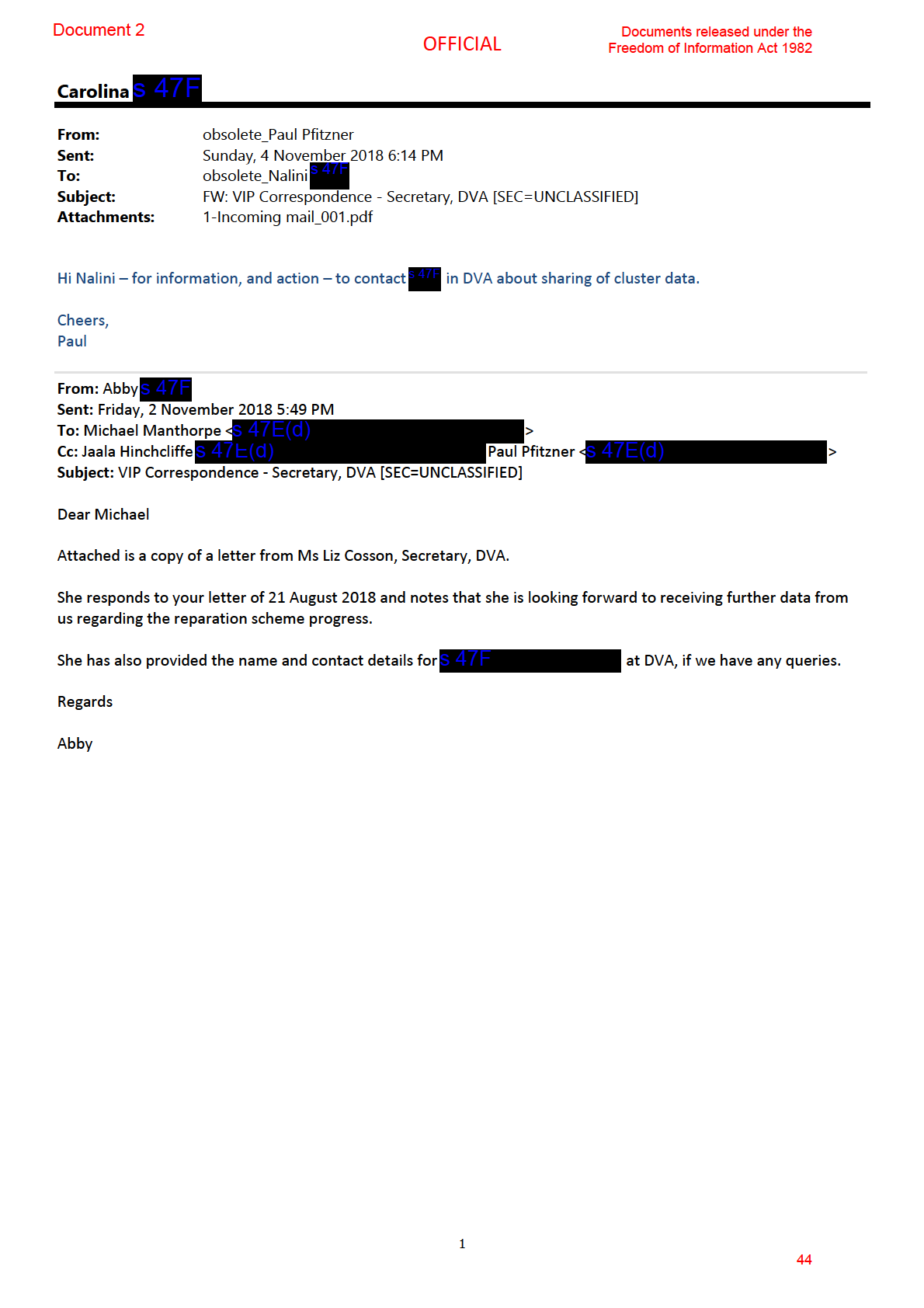
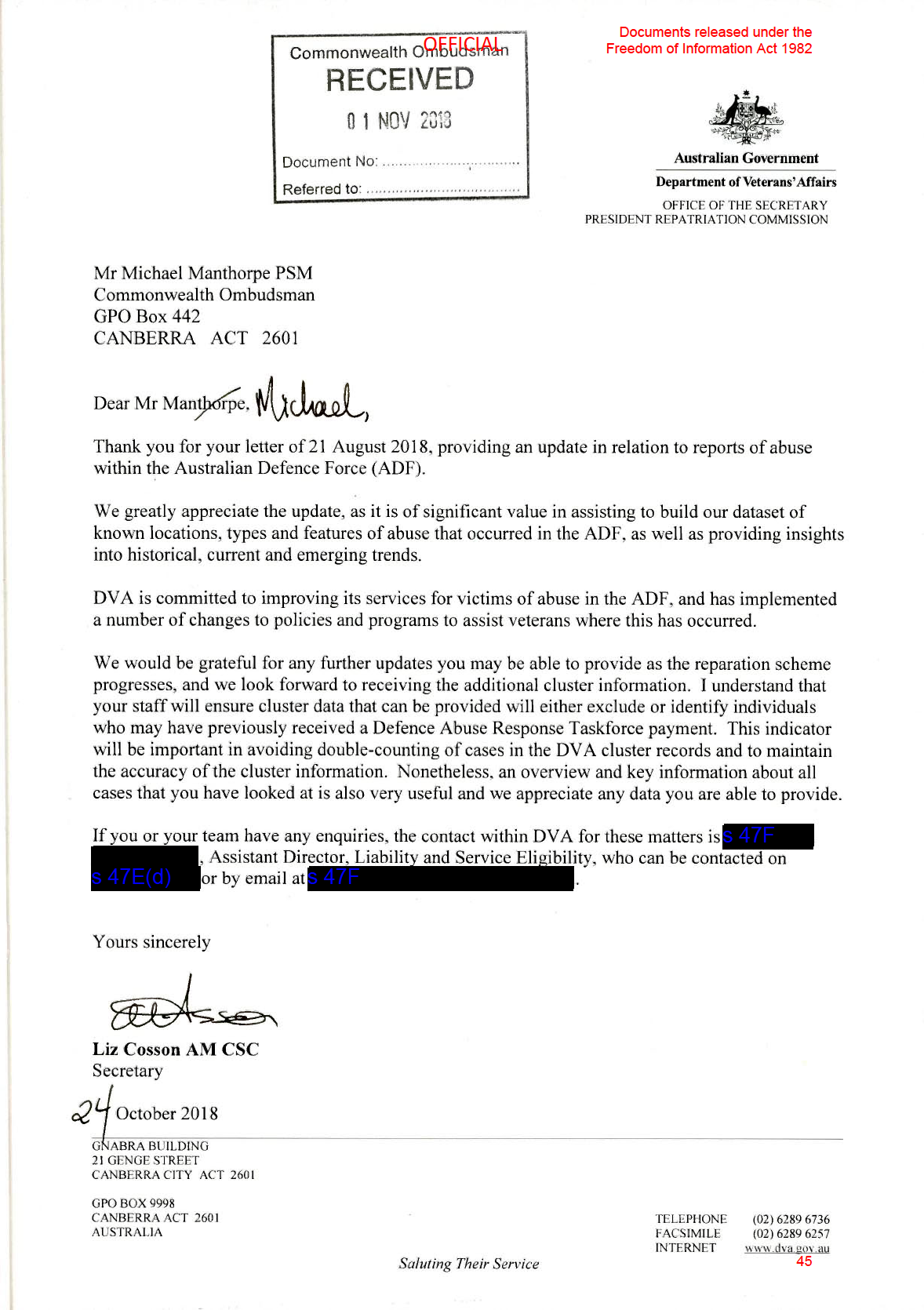
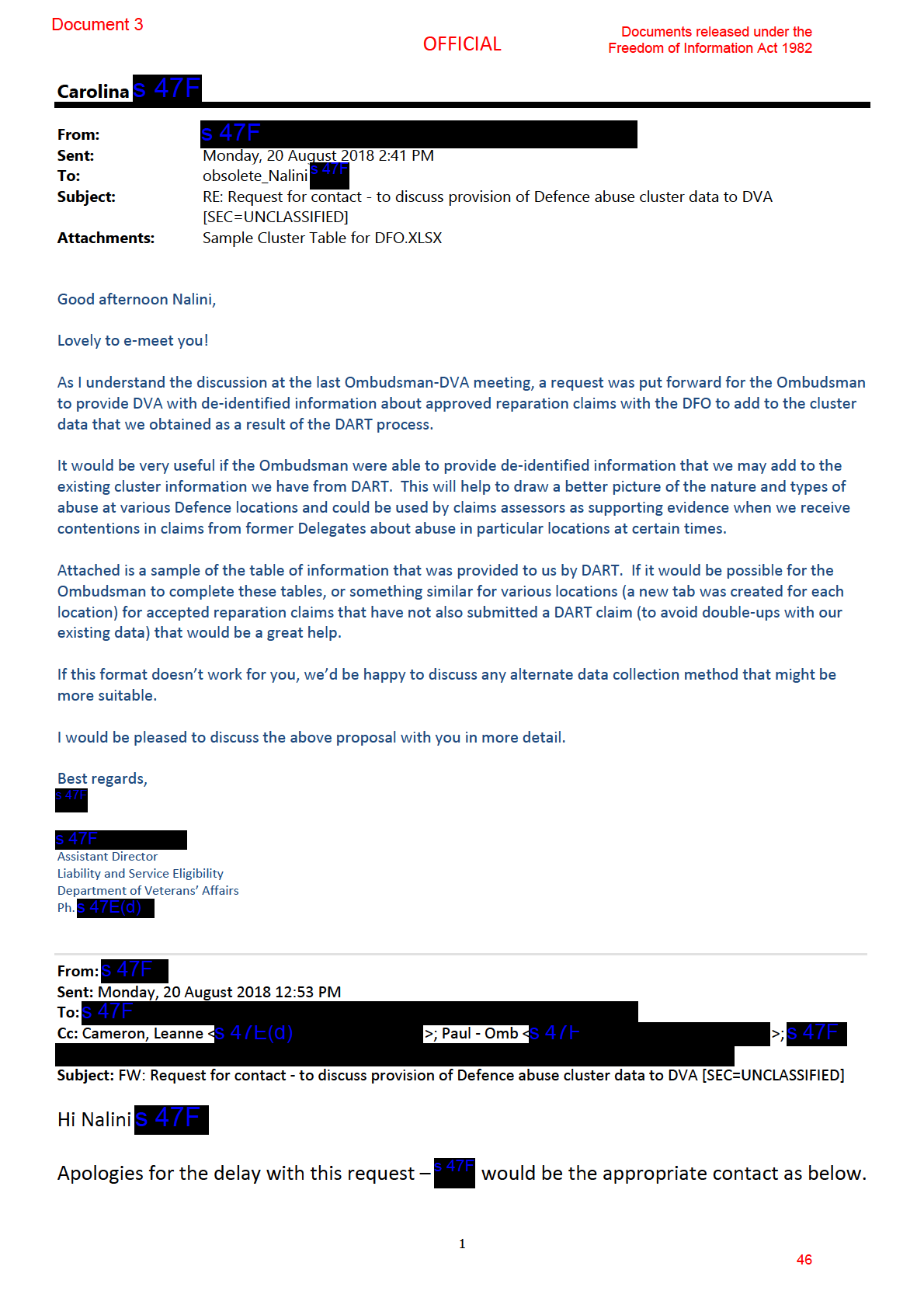
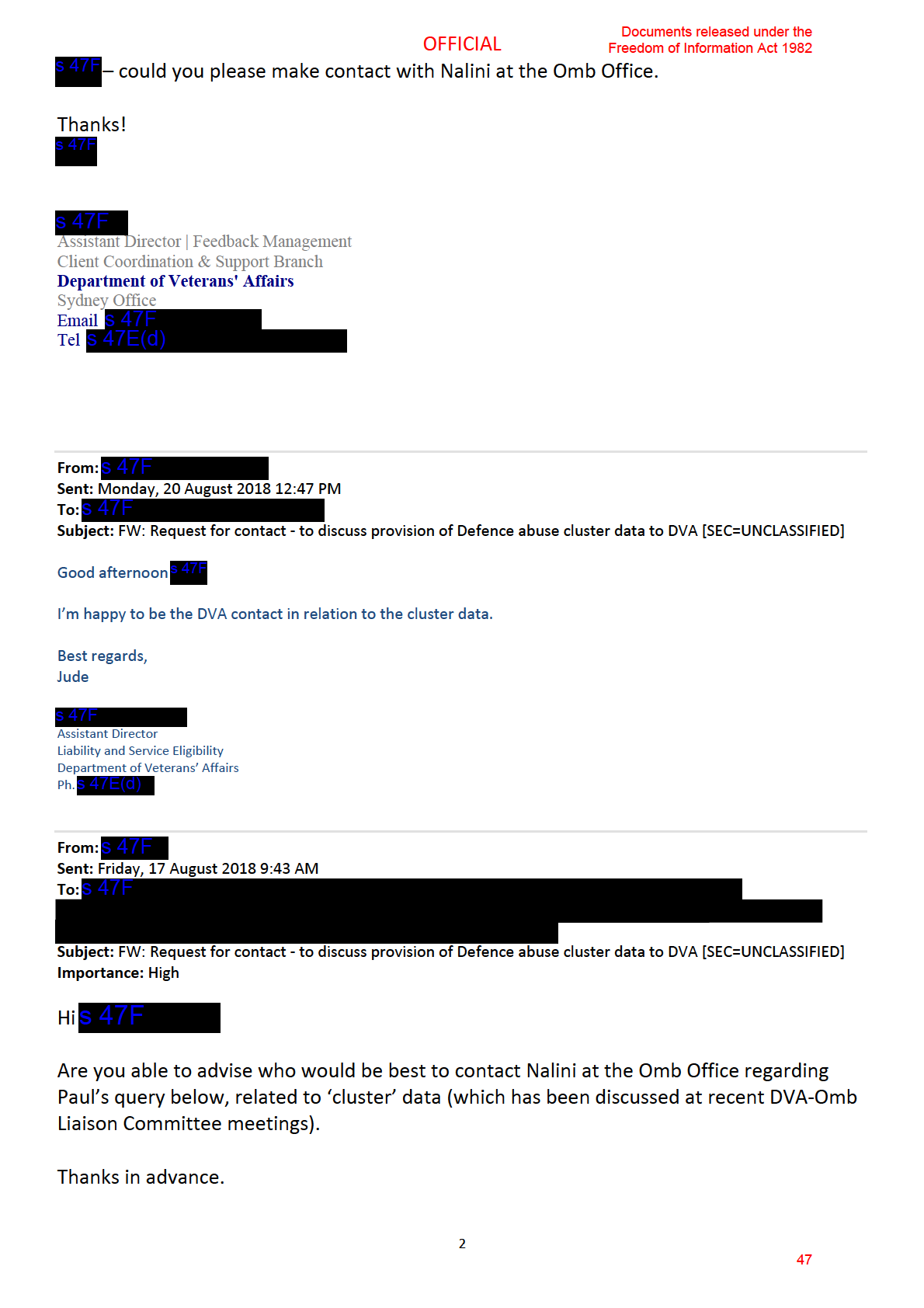
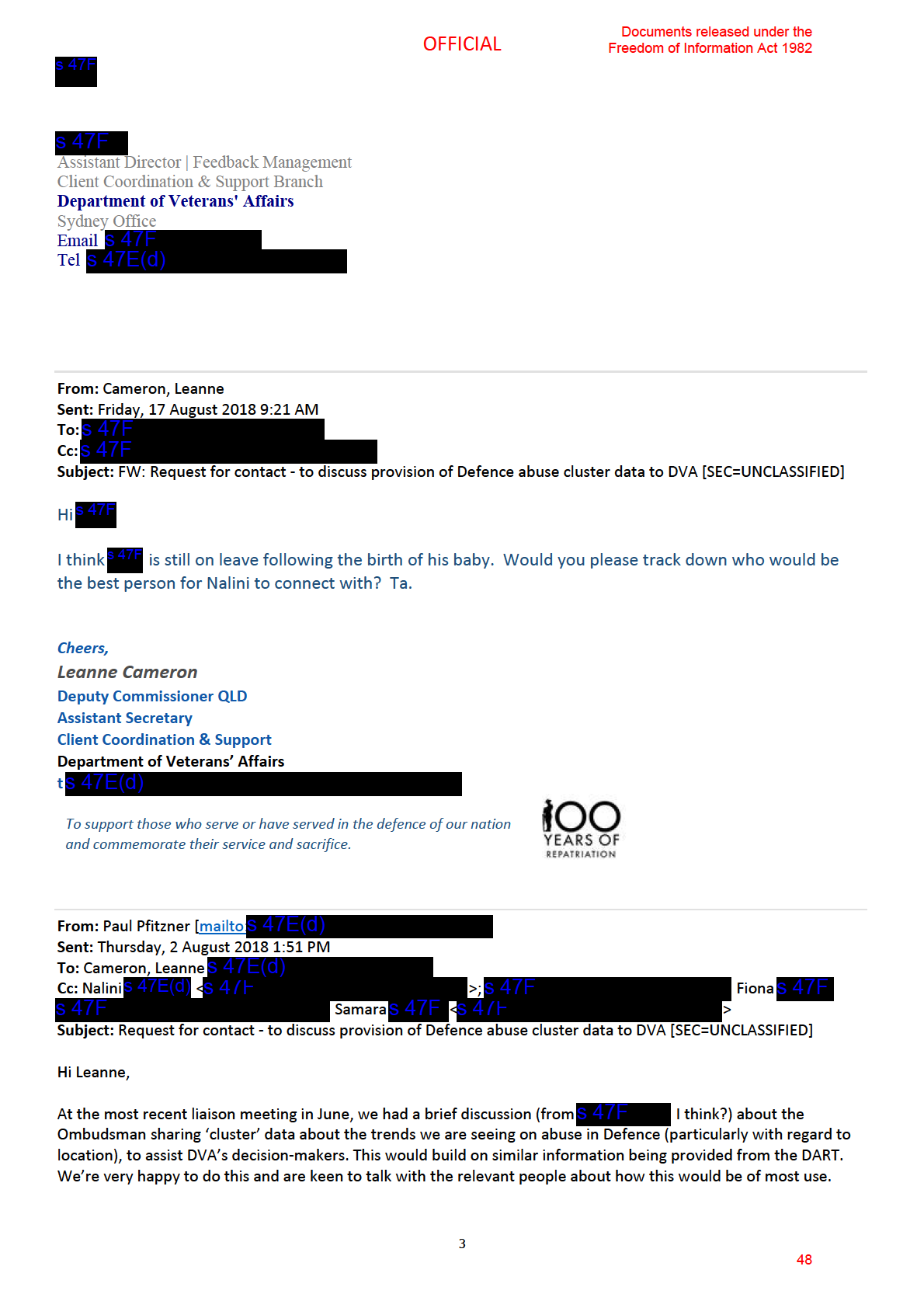

OFFICIAL
Documents released under the
Freedom of Information Act 1982
Nalini s 47F (s 47E(d), copied in this email) is our primary contact. I would be grateful if s 47F or the relevant
contact in DVA could get in touch with Nalini and we can discuss the best way for this to occur.
Happy to discuss further. Otherwise, we look forward to hearing from you.
Thanks,
Paul
______________________________
Paul Pfitzner
Senior Assistant Ombudsman
Program Delivery Branch
COMMONWEALTH OMBUDSMAN
Phone: s 47E(d)
Mobile:s 47E(d)
Email: s 47E(d)
Website: ombudsman.gov.au
Influencing systemic improvement in public administration
The Office of the Commonwealth Ombudsman acknowledges the traditional owners of country throughout Australia
and their continuing connection to land, culture and community. We pay our respects to elders past and present.
---------------------------------------------------------------------
COMMONWEALTH OMBUDSMAN - IMPORTANT CONFIDENTIALITY NOTICE
This e-mail message or an attachment to it is confidential, and it is intended to be accessed only by the
person or entity to which it is addressed.
No use, copying or disclosure (including by further transmission) of this message, an attachment or the
content of either is permitted and any use, copying or disclosure may be subject to legal sanctions. This
message may contain information which is:
* about an identifiable individual;
* subject to client legal privilege or other privilege; or
* subject to a statutory or other requirement of confidentiality.
If you have received this message in error, please call 1300 362 072 to inform the sender so that future
errors can be avoided.
---------------------------------------------------------------------
IMPORTANT
1. Before opening any attachments, please check for viruses.
2. This e-mail (including any attachments) may contain confidential information
for the intended recipient. If you are not the intended recipient,
please contact the sender and delete all copies of this email.
3. Any views expressed in this e-mail are those of the sender and are not
a statement of Australian Government Policy unless otherwise stated.
4. Electronic addresses published in this email are not conspicuous publications and DVA does not
consent to the receipt of commercial electronic messages.
4
49
OFFICIAL
Documents released under the
Freedom of Information Act 1982
5. To unsubscribe from emails from the Department of Veterans' Affairs (DVA) please go to
http://www.dva.gov.au/contact_us/Pages/feedback.aspx
, and advise which mailing list you would like to unsubscribe from.
6. Finally, please do not remove this notice.
5
50
